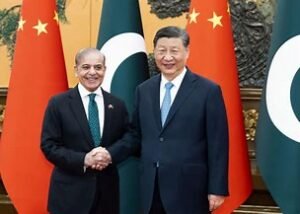In a surprising move, Pakistan’s Prime Minister Shehbaz Sharif extended his congratulations to Indian Prime Minister Narendra Modi on his record third consecutive term. This gesture, made six days after Modi’s Bharatiya Janata Party (BJP) secured a significant victory in the Indian general elections, marks a potential thaw in the often frosty relations between the neighboring nations.
A Historic Electoral Victory
The BJP, under Modi’s leadership, won a commanding 293 seats out of 543 in the Lok Sabha, surpassing the majority mark of 272. The National Democratic Alliance (NDA), which includes the BJP, subsequently declared Modi as their leader, leading to his swearing-in as Prime Minister on a Sunday. Modi’s third term is seen as a significant achievement, highlighting the continued support for his leadership and policies among the Indian electorate.
Shehbaz Sharif’s Congratulatory Message

Shehbaz Sharif took to social media platform X to convey his congratulations. “Felicitations to @narendramodi on taking oath as the Prime Minister of India,” Sharif wrote. This message came shortly after his return from a five-day visit to China, where he met with Chinese President Xi Jinping to seek further investment in Islamabad. This visit underscores Pakistan’s strategic balancing act between strengthening its ties with China, a key ally and economic partner, and engaging diplomatically with India. By extending congratulations to Modi, Sharif highlights a nuanced approach to regional diplomacy, seeking stability and cooperation despite longstanding tensions.
Context of the Gesture
The congratulatory message from Pakistan’s Prime Minister is notable against the backdrop of longstanding tensions and periodic conflicts between India and Pakistan, particularly over the disputed region of Kashmir. These tensions have frequently overshadowed diplomatic efforts and hindered progress towards peaceful coexistence. By extending congratulations, Sharif signals a willingness to engage in constructive communication and explore avenues for resolving bilateral issues through dialogue and diplomacy.
Diplomatic Relations and Regional Stability
The timing of Sharif’s message underscores the importance of regional stability and the recognition of India’s democratic processes. Acknowledging Modi’s electoral victory is a step towards fostering diplomatic dialogue and promoting stability in the region. It sets a positive tone for future diplomatic engagements, opening the door for dialogue and cooperation on shared challenges such as regional security, terrorism, and economic development.
Exclusion from the Swearing-In Ceremony
Despite this positive gesture, the underlying tensions were evident as Pakistan was not invited to Modi’s swearing-in ceremony. India extended invitations to the heads of neighboring countries such as Maldives, Bangladesh, Sri Lanka, Bhutan, Mauritius, and Nepal, but not to Pakistan. This exclusion highlights the ongoing diplomatic chill between the two nations.
Earlier, when asked about the absence of a congratulatory message from Pakistan, Foreign Office spokesperson Mumtaz Zahra Baloch stated that it was premature to talk about congratulating Modi before the new government was officially sworn in. She emphasized Pakistan’s desire for cordial and cooperative ties with all its neighbors, including India, and the resolution of disputes through talks.
A Decade of Diplomatic Shifts
The relationship between India and Pakistan has seen significant shifts over the past decade. In 2014, Modi’s first swearing-in ceremony was attended by then-Pakistan Prime Minister Nawaz Sharif, signaling a period of hopeful engagement. However, subsequent events, such as the militant attack on an Indian Army camp in Uri and the Pulwama attack in 2019, led to heightened tensions and a suspension of bilateral communication.
The revocation of Article 370 of the Indian Constitution in August 2019, which altered the special status of Jammu and Kashmir, further soured relations. Pakistan’s efforts to challenge this decision on international forums did not gain much traction, and bilateral trade was suspended.
Recent Developments
In 2022, Shehbaz Sharif’s rise to power did not immediately change the dynamics between the two countries. When Modi congratulated Sharif on becoming the Prime Minister of Pakistan, the gesture was not reciprocated. The situation at the Attari-Wagah border, once a major trade route, remains stagnant.
However, Sharif’s recent congratulatory message to Modi on his third term could signal a willingness to explore new avenues for dialogue. While this gesture alone may not immediately resolve the deep-rooted issues between the two nations, it sets a positive tone for future diplomatic engagements and cooperation.
The congratulatory message from Pakistan’s Prime Minister Shehbaz Sharif to India’s Prime Minister Narendra Modi marks a significant moment in the complex relationship between the two countries. It underscores the importance of diplomatic communication and engagement in defusing tensions and promoting peace in the region. While challenges remain, this gesture sends a message of hope to the people of both countries, signaling a potential shift towards constructive engagement and cooperation.











